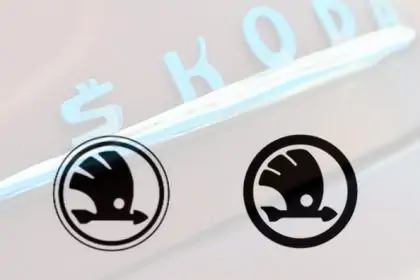Does a partial withdrawal and limitation to one part of the goods and services in the opposition proceedings entail a partial withdrawal of the opposition to the other part? The CFI explained in this context the scope of the Board of Appeal’s examination in the opposition proceedings between Škoda and Škoda.
Opposition proceedings: EU figurative mark “Arrow with wings”

In this ruling from yesterday (on 13 October 2021, T-712/20) in trade mark proceedings between Škoda Auto and Škoda Investment (both Czech Republic) concerning the EU figurative mark “arrow with wings”, the CFI dealt in detail with the scope of the Board of Appeal’s examination in opposition proceedings in the context of an appeal relating to a relative ground for refusal of a trade mark.
That was the case as applicant Škoda Investment had opposed the trade mark application of the intervener, Škoda Auto a.s., with reference to Article 8(1)(a) and (b) of Regulation 2017/1001, i.e. it had relied on the fact that the contested trade mark “arrow with wing” was identical to its own earlier trade mark and that, because of the identity or similarity, there was also a likelihood of confusion in relation to the goods or services claimed. This is a so-called relative ground for refusal of a trade mark.
The case was complicated because both marks in dispute are based on a priority of another mark: the mark of Skoda Auto a.s. claims the priority of the Lebanese mark No. 88468 of May 2018, whereas the mark of Škoda Investment claims the priority for the application of the Czech mark No. 550086 of August 2018.
Partial withdrawal in opposition proceedings
With reference to the earlier priority of the Lebanese trade mark, the Opposition Division had rejected the opposition of the applicant Škoda Investment, whereupon Škoda Investment filed a complaint before the Board of Appeal. It argued, the Opposition Division had failed to observe (in breach of Article 34(1) of Regulation 2017/1001) that an EU trade mark must be identical to the trade mark from the priority. However, specifically tracking and navigation software of Nice class 9 (and even further goods and services of classes 9, 38 and 39) were not included in the scope of protection of the Lebanese trade mark.
Škoda Investment was also upheld for these contested goods and services, and the decision of the Opposition Division was reversed by the Board of Appeal of the EUIPO with regard to them.
However, this partial withdrawal also had the consequence that the goods and services not mentioned in that statement of grounds were no longer part of the opposition proceedings and that the rejection of the opposition had become final in respect of those unmentioned goods and services.
The applicant Škoda Investment considered this to be a procedural error and a breach of essential procedural requirements to be examined ex officio, which should have led to the complete annulment of that decision ex officio. It brought an action before the European Court of Justice (CFI).
Scope of the examination of the Board of Appeal
In this context, the CFI explained the scope of the Board of Appeal’s examination in opposition proceedings.
i. Not beyond the appeal filed
Accordingly, in the context of an appeal relating to a relative ground for refusal of a trade mark and directed against a decision of the Opposition Division, the Board of Appeal may not go beyond the subject-matter of the appeal before it. The Board of Appeal is thus bound by the limits of the relief sought by the appellant’s appeal.
ii. Exception: fundamental procedural requirements
However, this does not apply to legal grounds which were not raised by the parties but which concern fundamental procedural requirements, the CFI added. This includes the rules governing the admissibility of an opposition, which the Board of Appeal is entitled to examine, the CFI noted.
iii. Board of Appeal may not amend applications
However, the Court emphasised that the Board of Appeal may not, in any event, amend of its own motion requests made by an appellant on appeal.
Grounds of appeal are the necessary basis for the relief sought in an appeal, the CFI explained, but they are distinct from those relief sought, which define the limits of such an appeal. The CFI referred to the ECJ judgment British Airways (C:2017:861), in which the highest European court had already ruled in the same way.
But that was relevant to the present case. If the Board of Appeal had annulled the Opposition Division’s decision in its entirety, as the applicant Škoda Investment claimed, this would have had the consequence, according to the CFI, that the Board would have gone beyond the subject matter of the dispute as defined by the applicant itself.
Examination by the Board of Appeal: correcting procedural errors
However, as long as a decision has not become final, its legality can be examined by the Board of Appeal in the case of an appeal, the ECJ emphasised, which was, moreover, the case here. Moreover, the task of the Board of Appeal is precisely to correct such procedural errors and consequently, if necessary, to annul a decision that is tainted with them.
The action brought by Škoda Investment a.s. was therefore dismissed in its entirety by the CFI.
Opposition proceedings – also an issue for you?
Our attorneys have many years of expertise in design law and trade mark law as well as in the entire field of intellectual property and are entitled to represent you before any court – in Germany and also internationally.
Please contact us if you are interested.
Sources for text and image:








Leave a Reply